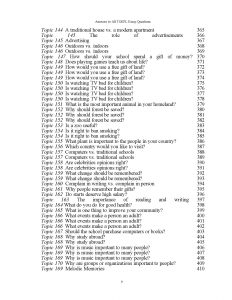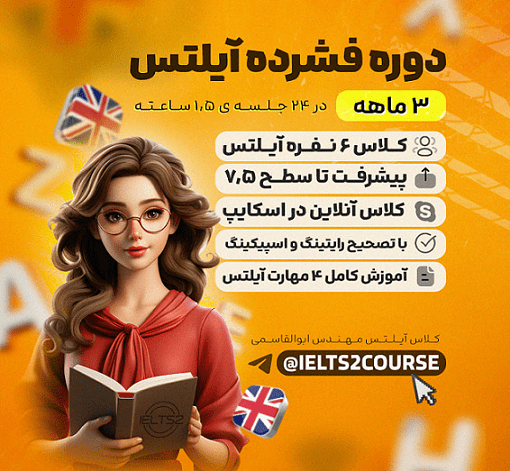نمونه سوالات اسپیکینگ آیلتس درباره (پارت 1 2 3)
در این بخش بیش از 20 مورد از نمونه سوالات اسپیکینگ آیلتس نمره 9 درباره “ارتش” را با هم میبینیم. این مجموعه از آخرین سوالات گزارش شده از سنترهای برگزار کننده آیلتس در ایران و خارج از کشور مربوط به پارت 1، 2 و 3 می باشند و شانس تکرار آن ها در آینده بالاست. در ادامه مطلب همچنین نکات گرامری، لغات و دلایل دریافت نمره 9 را به طور مشخص توضیح داده ایم تا راهنمایی برای علاقمندان باشد. 1000 نمونه سوالات اسپیکینگ آیلتس با جواب PDF پارت 1 2 3 پیشنهاد بعدی ما به شما عزیزان است.
نمونه سوالات اسپیکینگ آیلتس درباره ارتش (پارت 1)
1. Do you think the military is important for a country?
Absolutely. A strong military ensures national security, deters external threats, and protects sovereignty. Beyond defense, it plays a crucial role in disaster response, peacekeeping missions, and technological advancements. Many nations invest in defense to maintain stability and international influence.
2. Would you ever consider joining the army?
While I deeply respect military service, I personally prefer contributing to society through different means, such as education or technology. However, I recognize the discipline, skills, and leadership qualities it instills in individuals.
3. What qualities should a soldier have?
A soldier must possess discipline, physical fitness, mental resilience, and strong decision-making abilities. Loyalty, teamwork, and adaptability are also essential for handling unpredictable situations effectively.
4. Do you think military training should be mandatory?
This depends on a country’s security needs. Mandatory service can promote patriotism and discipline, but in democratic societies, voluntary service may be more effective, ensuring only committed individuals join.
5. How has the role of the military changed over time?
Modern militaries focus not only on warfare but also on cybersecurity, intelligence, and humanitarian missions. Technological advancements have transformed strategies, with drones and AI playing a bigger role in defense.
6. What are the benefits of serving in the army?
Soldiers gain leadership, discipline, and teamwork skills. They also receive education, healthcare, and career opportunities. Additionally, they develop a strong sense of purpose and patriotism.
7. What challenges do soldiers face?
Soldiers endure physical and mental stress, prolonged separations from family, and exposure to combat dangers. Post-service reintegration can also be difficult, with many facing PTSD and employment challenges.
8. How does the military contribute to technological innovation?
Many civilian technologies, like GPS and the internet, originated from military research. Today, advancements in AI, robotics, and cybersecurity continue to emerge from defense projects.
9. Do you think military spending is justified?
It depends on a country’s security situation. While some argue excessive spending diverts funds from social services, others believe a strong military is essential for stability and national defense.
10. How does the military impact international relations?
A nation’s military strength influences diplomacy, alliances, and conflict resolution. Peacekeeping missions and joint military exercises also foster international cooperation and security.
نمونه سوالات اسپیکینگ آیلتس درباره ارتش (پارت 2)
Describe the role of the military in modern society.
You should say:
- What responsibilities the military has today
- How the military helps civilians
- What technological advancements have influenced the military
- Whether military service should be compulsory
Band 9 Answer (250 words)
The military serves as the backbone of national security, protecting borders and maintaining stability. However, its role has expanded significantly beyond traditional warfare. Today, the military is involved in peacekeeping operations, disaster relief, and even cybersecurity. In many nations, soldiers assist in humanitarian missions, providing medical aid, rebuilding infrastructure, and supporting communities during crises such as natural disasters or pandemics.
One key aspect of the military’s modern role is its impact on civilian life. For instance, during national emergencies, armed forces provide logistical support, rescue operations, and aid distribution. Additionally, in developing nations, military engineers contribute to infrastructure projects, such as roads and hospitals, improving quality of life.
Technological advancements have also revolutionized military strategies. Artificial intelligence, drone warfare, and cyber-defense systems have reshaped modern combat. The use of automation reduces human casualties while enhancing precision and efficiency. Furthermore, military innovations frequently spill over into civilian life—GPS, the internet, and medical advancements all have military origins.
Regarding compulsory service, opinions are divided. Some argue mandatory military service fosters discipline, unity, and patriotism among young people. Others believe voluntary enlistment is more effective, ensuring that only those committed to serving the country join. Ultimately, the role of the military will continue evolving, integrating technology while balancing national defense with humanitarian responsibilities.
نمونه سوالات اسپیکینگ آیلتس درباره ارتش (پارت 3)
1. What is the main purpose of the military in today’s world?
The military’s primary role is national defense, ensuring territorial integrity and sovereignty. However, its responsibilities have expanded beyond combat. Today, armed forces contribute to peacekeeping missions, disaster relief, counterterrorism, and cybersecurity. They also assist in humanitarian aid and medical support during crises like pandemics and natural disasters. Technological advancements have transformed military strategies, with AI, drones, and cyber operations becoming integral to defense systems. Additionally, many countries use their military strength as a diplomatic tool, influencing international relations and geopolitical stability. In essence, the modern military is not just about warfare but also about maintaining global security, advancing technology, and providing aid to both domestic and international communities in times of need.
2. How has modern technology influenced military operations?
Technology has revolutionized military operations, making them more precise, efficient, and strategic. Drones and AI-powered surveillance enhance intelligence gathering, reducing human risk. Cybersecurity has become a crucial battlefield, with nations defending against cyber threats that could compromise national security. Autonomous weapons, robotics, and missile defense systems have improved accuracy and minimized collateral damage. Additionally, satellite technology aids communication and navigation, ensuring effective coordination. While these advancements strengthen defense capabilities, they also raise ethical concerns, such as AI-driven warfare and data privacy. The future of military technology lies in automation, space defense, and enhanced cybersecurity, ensuring that warfare becomes more strategic while reducing unnecessary human casualties.
3. Should governments increase or decrease military spending?
The decision to increase or decrease military spending depends on national security needs, geopolitical threats, and economic priorities. Nations facing security risks or unstable borders may require higher military budgets to ensure protection. Additionally, investments in cybersecurity and technology are crucial in modern warfare. However, excessive spending can divert funds from essential services like healthcare and education. A balanced approach is ideal—governments should allocate sufficient resources for defense while ensuring that social and economic development is not compromised. Transparency in defense budgets is also necessary to prevent corruption and misuse of funds. Ultimately, military spending should align with a country’s security requirements and long-term strategic goals.
4. What are the advantages and disadvantages of compulsory military service?
Compulsory military service instills discipline, patriotism, and resilience in young people. It fosters national unity and prepares citizens to handle emergencies, such as natural disasters and security threats. Many argue that mandatory service strengthens a nation’s defense capabilities by maintaining a ready and trained force. However, it also has drawbacks. Forcing individuals into military service can be inefficient, as not everyone is suited for combat or defense roles. Additionally, it can disrupt career and education paths, delaying personal and professional growth. A voluntary system allows for a more motivated and skilled military, ensuring that those who serve are committed and well-prepared. The ideal approach varies by country, depending on security concerns and cultural values.
5. How does military power influence international relations?
Military strength plays a crucial role in shaping international relations, often serving as a deterrent against conflicts. A powerful military enhances diplomatic leverage, allowing nations to negotiate from a position of strength. It also fosters alliances, as countries with strong defense capabilities are seen as valuable partners. However, excessive militarization can lead to global tensions and arms races. Peacekeeping missions, defense collaborations, and joint military exercises strengthen international cooperation. A well-balanced approach is necessary—while military power can prevent conflicts, diplomacy and economic partnerships remain essential for maintaining stable international relations. Ultimately, military strength should support, not replace, diplomatic efforts in resolving disputes and fostering global peace.
6. What role does the military play in disaster response?
The military is instrumental in disaster response, providing immediate relief during natural calamities such as earthquakes, floods, and hurricanes. Armed forces possess the logistical capacity to deliver aid, evacuate affected populations, and restore infrastructure swiftly. Their expertise in coordination and resource management ensures efficient disaster response efforts. Additionally, military engineers help rebuild roads, bridges, and essential facilities in affected areas. Medical units offer healthcare support, treating injuries and preventing disease outbreaks. Military involvement in disaster relief showcases their broader societal role beyond defense. However, reliance on the military for civilian crises should not overshadow the need for well-funded emergency response agencies. A collaborative approach between military and humanitarian organizations ensures effective disaster management.
7. What are the ethical concerns surrounding military technology?
Military technology raises significant ethical concerns, particularly regarding autonomous weapons, AI-driven warfare, and surveillance. The development of drones and AI-powered combat systems minimizes human casualties but also reduces accountability, as machines make life-and-death decisions. Cyber warfare poses risks to civilian infrastructure, potentially disrupting essential services. The militarization of artificial intelligence raises fears of uncontrollable escalation, where AI may act unpredictably. Additionally, advanced surveillance tools may infringe on privacy rights. Ensuring ethical oversight, transparent policies, and international regulations are crucial to preventing misuse. While technology enhances defense capabilities, its deployment must align with humanitarian principles, ensuring that military advancements do not compromise ethical standards or global security.
8. How can soldiers reintegrate into civilian life after military service?
Transitioning from military to civilian life can be challenging, as soldiers often face psychological, social, and employment difficulties. Many struggle with post-traumatic stress disorder (PTSD), requiring mental health support. Governments should provide reintegration programs, including career training, counseling, and financial assistance. Employers should recognize the valuable skills veterans bring, such as leadership, teamwork, and discipline. Community support networks also play a crucial role in helping soldiers adapt. Education initiatives can assist veterans in acquiring new qualifications, ensuring a smoother transition. Societies must acknowledge and respect veterans’ contributions, offering them opportunities to reintegrate successfully while addressing any psychological or economic challenges they may face.
9. What are the risks of increasing global militarization?
The rise in global militarization poses multiple risks, including heightened geopolitical tensions, arms races, and economic burdens. When nations prioritize military expansion, diplomatic solutions may take a backseat, increasing the likelihood of conflicts. Excessive military spending can divert resources from social programs, exacerbating inequalities. The proliferation of advanced weaponry, including nuclear and AI-powered arms, raises concerns about unintended escalation. Additionally, global militarization may lead to regional instability, where smaller nations feel compelled to strengthen their defenses, escalating tensions. To mitigate risks, international cooperation, arms control agreements, and diplomatic engagement must be prioritized over aggressive military expansion. A balanced approach ensures security without exacerbating global instability.
10. Should artificial intelligence be used in military decision-making?
AI has transformed military operations by enhancing surveillance, predictive analytics, and combat efficiency. However, fully integrating AI into military decision-making raises ethical and strategic concerns. While AI can process vast amounts of data quickly, it lacks human judgment, empathy, and ethical reasoning. Autonomous weapon systems risk acting unpredictably, potentially escalating conflicts. AI-driven warfare also raises accountability issues—who is responsible if an AI system makes a fatal error? While AI should assist decision-making by improving intelligence analysis and logistical planning, ultimate control must remain with human military leaders. A hybrid approach, where AI supports but does not replace human judgment, ensures ethical and responsible military operations.
پاسخ به سوالات اسپیکینگ آیلتس درباره ارتش در بالا در سطح نمره 9 آیلتس هستند به دلایل زیر:
1. پاسخ دقیق و کامل به سوالات (Task Response & Development)
- تمام بخشهای سوالات بهطور کامل و دقیق پاسخ داده شده است. در هر پاسخ، نویسنده به تمام جوانب و ابعاد موضوع پرداخته و آن را با جزئیات توضیح داده است. برای مثال، در سوالات مربوط به تکنولوژی نظامی یا نقش نظامی در روابط بینالملل، نویسنده با ذکر جزئیات از کاربردهای فناوریهای نوین و چالشهای اخلاقی صحبت کرده است.
- همچنین، پاسخ به سوالات اسپیکینگ آیلتس درباره ارتش حاوی تحلیلهای عمیق و متنوع هستند و سعی شده است که از دیدگاههای مختلف به موضوعات نگاه شود.
2. استفاده از دایره لغات گسترده و دقیق (Lexical Resource)
- در این پاسخها، از واژگان تخصصی و پیشرفته بهطور صحیح و طبیعی استفاده شده است. کلمات و ترکیباتی مثل cybersecurity, autonomous weapons, geopolitical stability, AI-powered surveillance, ethical concerns به کار رفتهاند که نشاندهنده تسلط نویسنده بر واژگان پیچیده و تخصصی است.
- همچنین، از ترکیبهای مختلف و مترادفها برای جلوگیری از تکرار استفاده شده است.
3. تنوع گرامری و دقت (Grammatical Range & Accuracy)
- در این پاسخها، جملات پیچیده و متنوعی مانند جملات شرطی (e.g., If AI is used in military decision-making, it raises ethical concerns)، جملات ربطی (e.g., The technology, which is advancing rapidly, has made warfare more precise)، و جملات مجهول (e.g., Military technology has been developed to enhance precision) استفاده شده است.
- هیچگونه اشتباه گرامری مشاهده نمیشود و جملهبندیها روان و بدون ایراد هستند.
4. انسجام و روانی (Fluency & Coherence)
- پاسخها کاملاً منسجم و روان هستند و نویسنده با استفاده از عبارات ربطی مانند However, On the other hand, Moreover توانسته است پیوستگی خوبی میان بخشهای مختلف پاسخ ایجاد کند.
- ایدهها به صورت منطقی و با پیوستگی بیان شدهاند و هیچ بخشی از پاسخ به صورت پراکنده یا ناقص باقی نمانده است. هر ایده بهطور کامل توسعه یافته و جزئیات کافی برای پشتیبانی از آن ارائه شده است.
5. لحن و سبک مناسب (Pronunciation & Tone in Speaking)
- پاسخها از نظر لحن و سبک نوشتاری کاملاً آکادمیک و رسمی هستند، در عین حال که خواننده به راحتی میتواند آنها را دنبال کند.
- در صورتی که این پاسخها به صورت شفاهی مطرح میشدند، لحن آنها کاملاً طبیعی و مشابه گفتار یک فرد نیتیو به نظر میرسید. هیچگونه سستی یا مکث غیرضروری در پاسخها وجود ندارد.
تعیین سطح رایگان اسپیکینگ ❤️
نمونه سوالات اسپیکینگ آیلتس درباره “ ارتش” پارت 1 2 3 را به همراه سمپل های نمره 9 آن ها با هم دیدیم. در ادامه نمونه سوالات دسته بندی شده اسپیکینگ آیلتس پیشنهاد آخر ما به دوستان گرامی هست. این نمونه سوالات اسپکینگ از پرتکرار ترین تاپیک های این بخش و همچنین جدیدترین موضوعات می باشند. این مجموعه توسط یکی از سایت های معتبر و فعال آیلتس تنظیم شده است. همچنین برای تعیین سطح و تعیین رایگان نمره اسپیکینگ و دریافت جدید ترین سمپل های نمره 9 در کانال تلگرام اسپیکینگ ما همراه باشید و به ادمین برای تعیین نمره اطلاع دهید.









